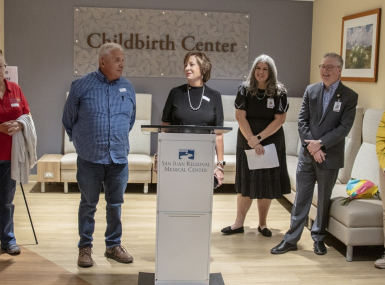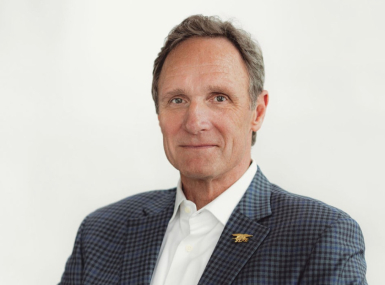Tareq Azim shares strength borne by fear
Key Takeaways
Tareq Azim knew all kinds of fear.
He saw the fear that imprinted on his mother’s life when her father was taken from her home in Afghanistan by Soviet troops, never to be seen again.
His own fear sprung from his peers seeing his father pay for groceries with food stamps, decades after he fled his homeland to raise his family in San Francisco as a refugee. Or the terror when he visited Afghanistan with his father in 2004, a monthlong trip that extended to five years.
What he learned about fear was to turn it on its head.
“It’s actually exposing something about you that you’ve been neglecting, and that circumstance, that situation, is almost forcing you to open up that version of yourself to actually feel and taste what freedom feels like,” he told the Opening General Session audience during a conversation with NACo President Mary Jo McGuire.
“That’s why I think we should deal with fear,” he said. “When we’re building our teams, we should really get down with our teammates and be able to have a once-a-month conversation about ‘How do people define fear? And what do they fear?”
For Azim, fear exists in a world of potential.
“There’s nothing that’s ever come into my life that hasn’t been an opportunity to disrupt the narrative that’s in my own head,” he said. “The disruption of this narrative was always my battle with this disease called fear.”
Azim, a personal trainer and coach, entrepreneur and hotelier, shared his experiences and perspectives and how they’ve shifted.
“I became very obsessed with wanting to change narratives,” he said of himself as a teenager. Those mediations led him to a conclusion that can seem counterintuitive.
“I don’t think that fear was designed or created or imposed on this by our creator to stop us from everything. It’s to get us closer to things.”
His early narrative shifted in high school, when he moved away from his identity as a soccer player — which was heavily influenced by his culture — to football, which led to a collegiate-playing career and his epiphany shortly after landing in Afghanistan after graduation.
He felt urged to contest the narrative that Afghanistan was uncivilized and hostile toward women.
“I realized my entire purpose in this world to this day has been the reconciliation of internal peace with the power of sport…and to create a federation for women in Afghanistan to play sports,” he said.
“There [were] massive political issues competing, which was this narrative of the oppression of women. Yes, that’s very true to the uneducated, but there’s a massive cohort of educated folks that want solutions to remove this oppression.”
Azim details the journey to building the Afghan Women’s Boxing Federation in his book “Empower: Conquering the Disease of Fear.” He describes approaching former Taliban foreign minister Wakil Ahmed Muttawakil, and the consideration that fear played in the process, but also the confidence that his task was worth taking a chance.
“Going to see Muttawakil would be a risky move,” he wrote. “Was it really worth it, just to get girls in Afghanistan to box? The more I considered that question, the more I landed on the same answer: Hell yeah.”
Related News

Now I know I can adapt my communication style
San Juan County, N.M. Commissioner Terri Fortner spent her career working with people one-on-one, but she overcame hangups about online communication when the pandemic forced her onto video calls when she first took office.

County service meets a veteran’s need for purpose in Spotsylvania County, Virginia
After Drew Mullins transitioned from a high-performance lifestyle in the military, he found the environment and purpose he sought when he took office in his county.
Now I know that solid waste is complicated
Custer County, Idaho Commissioner Will Naillon says solid waste removal is "one of the things that people often take for granted until it’s their job to make sure it happens... that’s the story of being a county commissioner."
